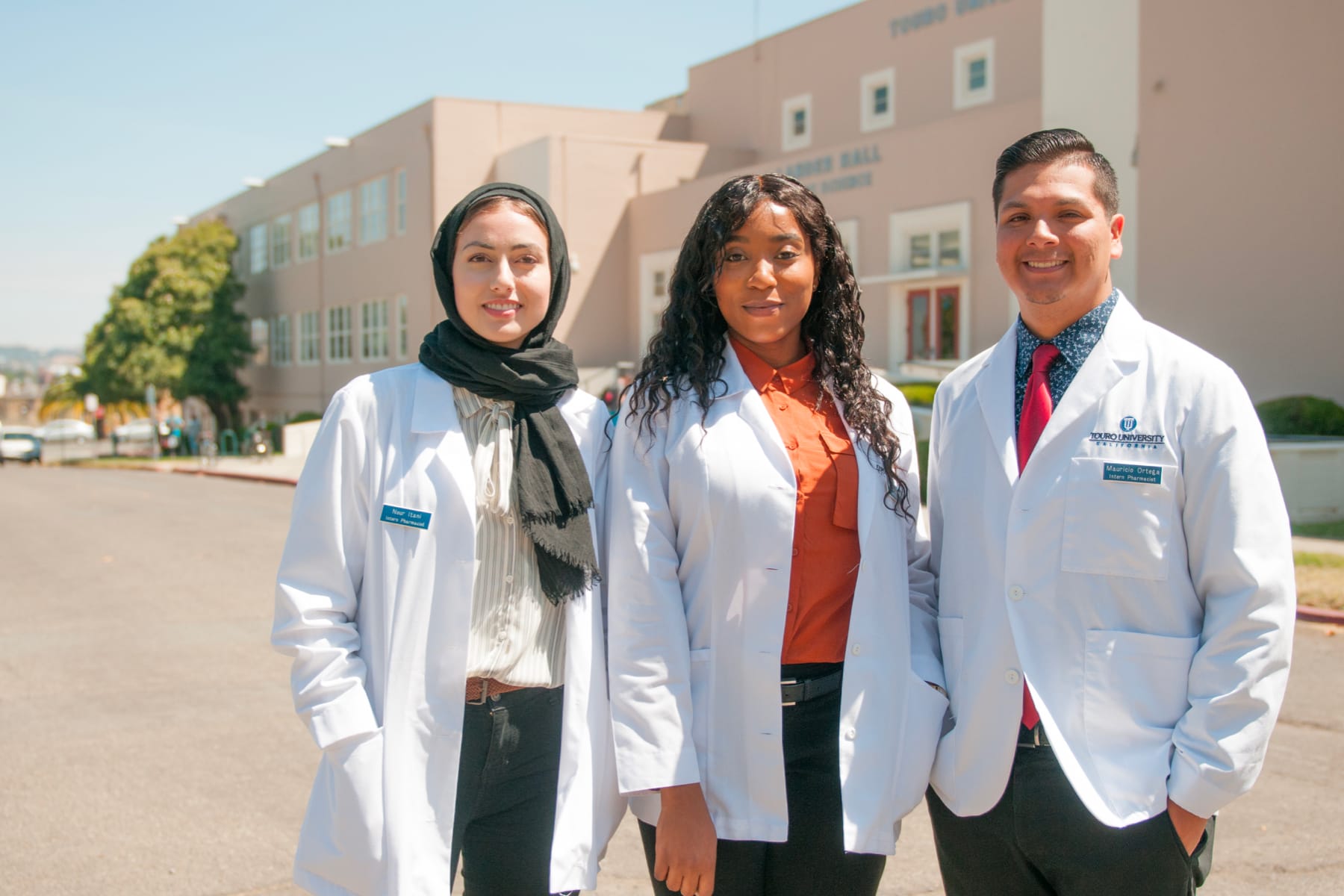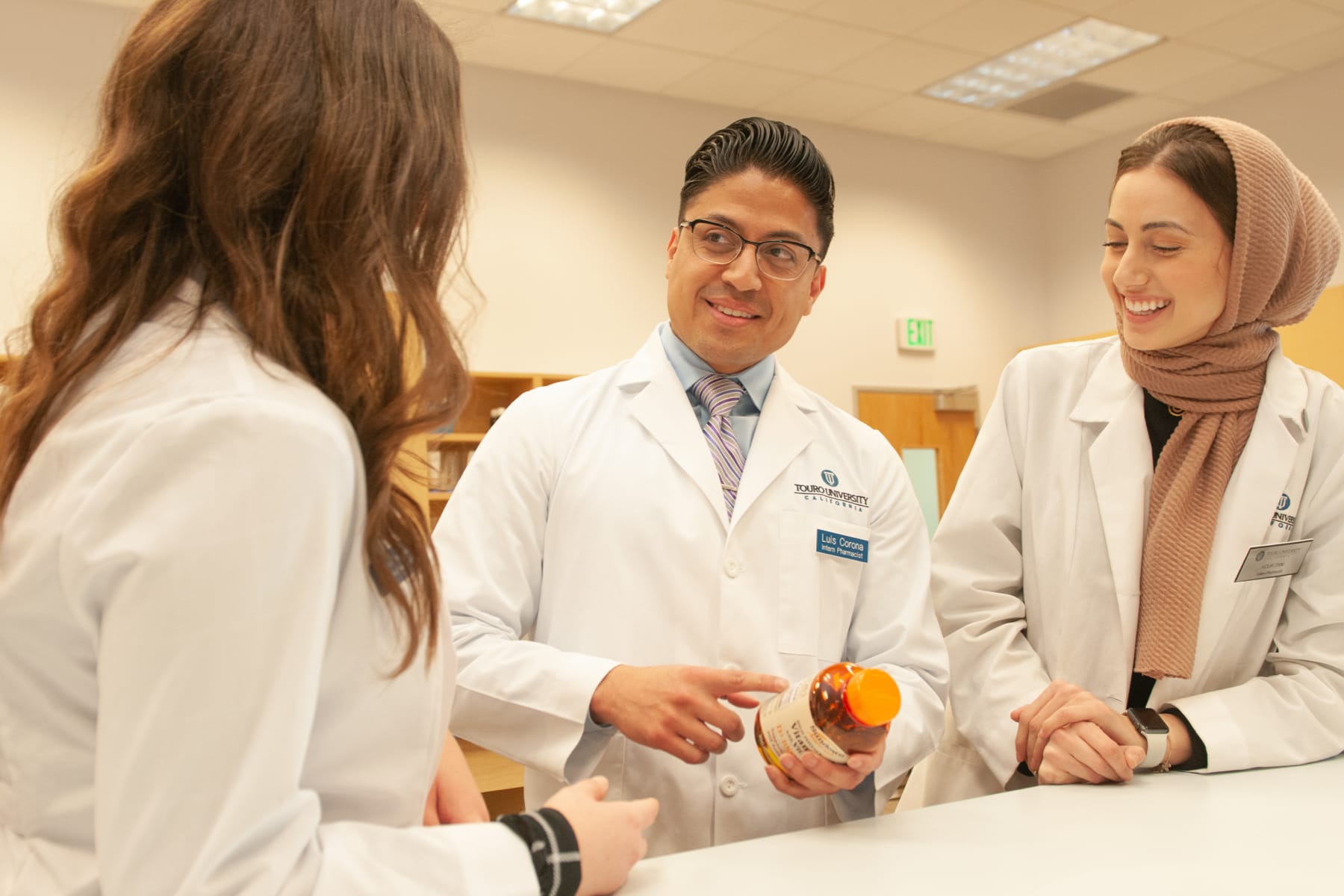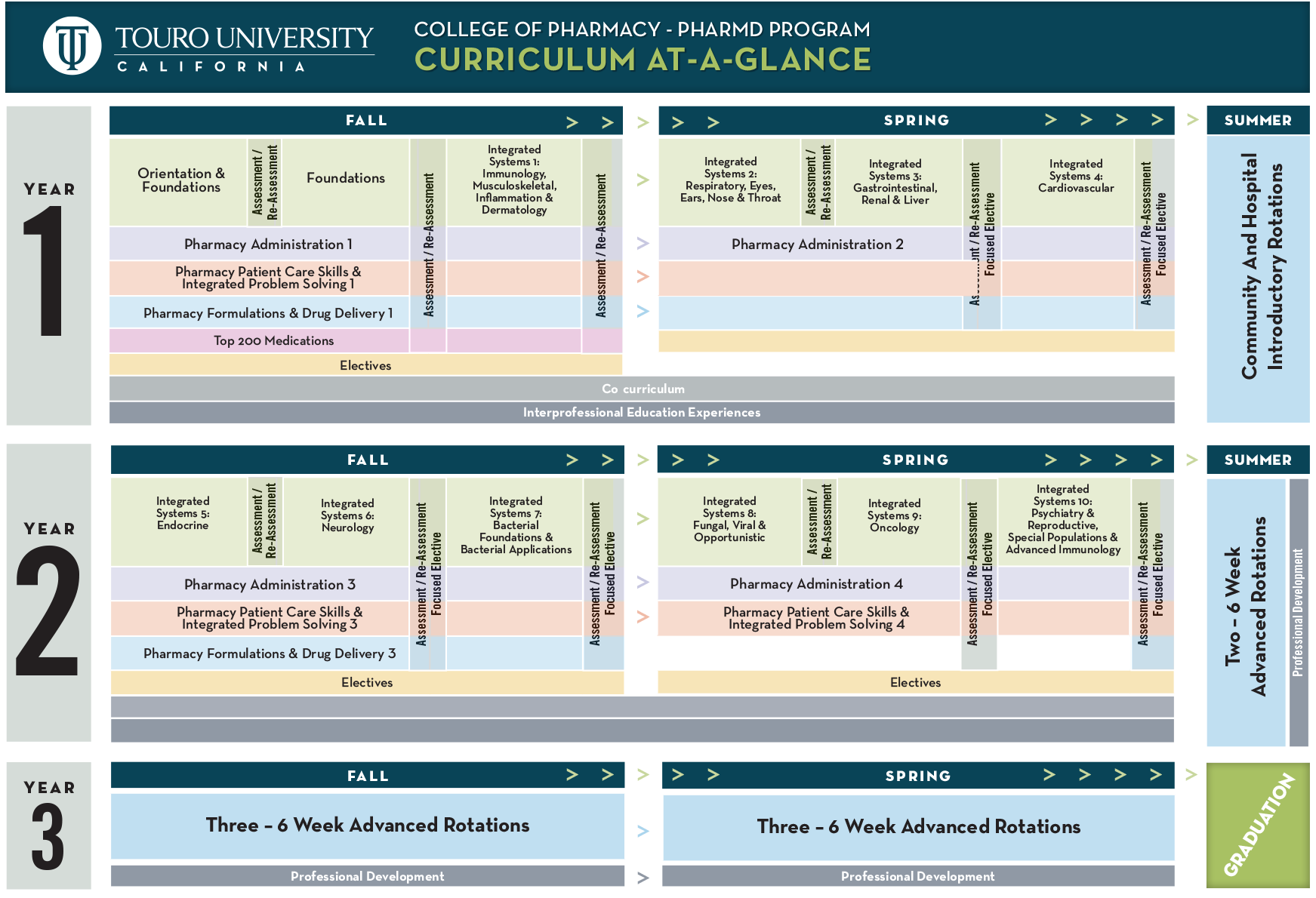
PharmD
New world, new approach. The world of pharmacy is built on innovation and so is Touro's unique PharmD program.
Our PharmD-in-3 program integrates medications, disease states, science, and skills while personalizing your education through elective course offerings. We use a unique competency-based education structure to ensure students’ progress and excel. An integrated curriculum promotes study across subjects and disciplines creating a holistic learning process. Students make meaningful connections through problem-solving, active learning, and skill-building leading naturally into real-life pharmacy practice experiences.
Our "PharmD in 3" Offers
- Integrated courses based on ‘organ systems’ that are offered in block format so that you learn everything about medications, disease states, and science one system at a time.
- Designated assessment and, when needed, re-assessment, to ensure all students have the chance to achieve competency with course content.
- Classroom and rotation-based electives help students individualize their learning.
- Certificates and microcredentials that help students stand out when it comes time to look for a residency or employment.
- Streamlined lecture/discussion topics to decrease repetitive content.
- Increased skills development built into the curriculum to help make students practice ready.
- 300 hours of introductory practice hours built into the curriculum.
- Seven 6-week advanced practice rotations to maximize hands-on training.
- Graduate 1 year earlier than most programs so you can practice as a pharmacist sooner.
What You'll Learn

Our PharmD didactic program uses an extended 19-week semester. More time = more learning and deeper understanding. Our experiential program is divided into two parts, each with increasing levels of responsibility and clinical maturity.
Pharmacists today have more clinical responsibilities and involvement in patient care. That’s why clinical training is important. In our 3-year program, you’ll engage in 7 advanced practice experiences.
Program Highlights
In Touro University California’s Doctor of Pharmacy program, you will:
- Collaborate with fellow health professions students to serve the community in our Student-Run Free Clinic, Mobile Diabetes Education Center, Vaccination Programs and more.
- Learn in a student-centered, interactive learning environment that is cooperative rather than competitive.
- Develop technical and professional skills in our JV Long Foundation Pharmacy Practice Center.
- Get more classroom and clinic experience for less than the average PharmD tuition in Northern California.
- Obtain outstanding professional and personal development opportunities to develop your fullest potential.
- Become a practice-ready graduate who is in high demand by employers.
- Benefit from our commitment to serving a diverse student body and patient population.
- The 2023-24 tuition will be $67,440.
Curriculum

Year 1
The first year of the pharmacy program (P1) starts Fall Semester with a University Orientation followed by a College of Pharmacy orientation called “Starter Dose for Success”, a 1-unit course to help students transition to pharmacy. Two block courses focus on Foundational Learning (Foundations I & II) needed for the integrated courses that follow. The first integrated course, Integrated Systems 1 (Immunology, Musculoskeletal, Inflammation & Dermatology), aligns with longitudinal courses such as Pharmacy Administration 1, Pharmacy Patient Care Skills and Integrated Problem Solving 1, Pharmacy Formulations and Drug Delivery 1, and Top 200 Medications. For the Fall Session there are three block assessments followed with an opportunity for re-assessments. Interprofessional and Co-curricular courses span the length of P1 Fall and Spring Sessions.
The Spring Session continues with a mix of block and longitudinal courses. Block courses such as Integrated Systems 2 (Respiratory, Eyes, Ears, Nose and Throat), Integrated Systems 3 (Gastrointestinal, Renal and Liver), and Integrated Systems 4 (Cardiovascular) align with longitudinal courses such as Pharmacy Administration 2, Pharmacy Patient Care Skills and Integrated Problem Solving 2, and Pharmacy Formulations and Drug Delivery 2. Elective courses span the length of the Spring Session with focused time occurring during re-assessment weeks. For the Spring Session there are three blocks for assessments and re-assessments. Community and hospital introductory rotations take place during the Summer Session between P1 and the second year of the pharmacy program (P2).
Year 2
The Fall Session of the P2 year follows the same block and longitudinal pattern as P1. Block courses include Integrated Systems 5 (Endocrine), Integrated Systems 6 (Neurology), and Integrated Systems 7 (Bacterial Foundations and Bacterial Applications). Longitudinal courses include Pharmacy Administration 3, Pharmacy Patient Care Skills and Integrated Problem Solving 3, Pharmacy Formulations and Drug Delivery 3 and Electives. For the Fall P2 Session there are three block assessments and re-assessments that include time for focused elective time. For the Fall and Spring Sessions Interprofessional and Co-curriculum courses span P2.
The Spring Session of the P2 year includes block courses such as Integrated Systems 8 (Fungal, Viral and Opportunistic), Integrated Systems 9 (Oncology), and Integrated Systems 10 (Psychiatry and Reproductive, Special Populations and Advanced Immunology) alongside longitudinal courses such as Pharmacy Administration 4, Pharmacy Patient Care Skills and Integrated Problem Solving 4, and Electives. For the Spring Session there are three block assessments and re-assessments including time for focused electives.
The Summer Session begins the advanced pharmacy practice experiences (APPEs) that occur in six-week blocks and are accompanied by professional development.
Year 3
The Fall and Spring Sessions of the third year of the pharmacy program (P3) include seven, 6-week APPEs alongside Professional Development for a total of eight APPEs that culminate with graduation at the end of the Spring Session.
Outcomes
Today there are more opportunities for pharmacists to work in diverse settings with an increasing scope of practice. Our graduates work in a variety of settings including hospitals, community pharmacies, compounding pharmacies, drug manufacturing companies, own their own pharmacies, teach, and conduct research, to name a few.
Demographics of the Class of 2021
- Over 90% attended a university in California
- 8% have master’s degree
- Cumulative GPA of 3.19
- Average age of 25
- About 90% are bilingual
